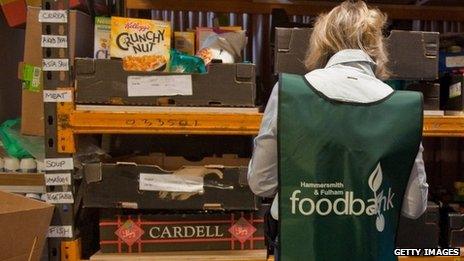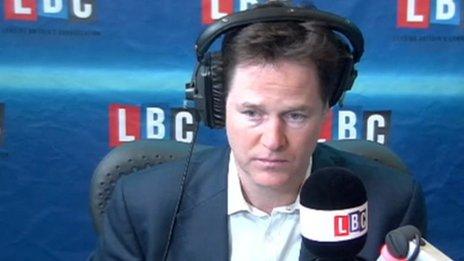Church of England bishops demand action over hunger
- Published

Forty-three Christian leaders, including 27 Anglican bishops, have signed a letter urging David Cameron to ensure people get enough to eat.
They argue that "cutbacks and failures" in the benefits system are forcing thousands of people to use food banks.
The End Hunger Fast campaign called the situation "truly shocking". It wants a national day of fasting on 4 April.
But the government said it wanted to help people "stand on their own two feet" by cutting welfare dependency.
The letter comes after Archbishop of Westminster Vincent Nichols, the leader of the Roman Catholic Church in England and Wales, warned last weekend that welfare reform was leaving people in "destitution" and labelled it a "disgrace".
But on Wednesday the prime minister defended the changes as a "moral mission" to return people to work from a life of dependency on the state.
Ed Thomas visits a food bank in Manchester
'Triple whammy'
The Christians who have signed the letter in the Daily Mirror newspaper, external include the bishops of Durham, Manchester and Leicester, as well as Quaker and Methodist leaders.
The letter stated: "We often hear talk of hard choices. Surely few can be harder than that faced by the tens of thousands of older people who must 'heat or eat' each winter, harder than those faced by families whose wages have stayed flat while food prices have gone up 30% in just five years.
"Yet beyond even this we must, as a society, face up to the fact that over half of people using food banks have been put in that situation by cutbacks to and failures in the benefit system, whether it be payment delays or punitive sanctions."
Giles Fraser, a Church of England parish priest in Kennington, London - and former canon chancellor of St Paul's Cathedral - told the BBC: "It's not the bishops' job [to find answers], that's the politicians' job. What the bishops are doing is reflecting the experience they have seen through their clergy on the ground.
"My church in south London is opening as a homeless shelter, we have people sleeping in our pews overnight, we are cooking for them. Homelessness in London has gone up 60 per cent in the last two years, this is the reality. Please acknowledge this."
He described what was happening as "really extreme poverty" and said it "feels as though the government is ignoring that".
The UK is in the midst of the most radical shake-up of the welfare system for decades. The government's welfare reforms include:
Introducing Universal Credit, which combines six means-tested benefits into a single payment
Capping the amount of benefits that working-age people can receive
Cutting benefits for social housing tenants with spare bedrooms
Capping rises to most working-age benefits and tax credits at 1%, instead of their increasing in line with inflation
Replacing disability living allowance with the new personal independence payment
End Hunger Fast said more than half a million people had received three days' emergency food from Trussell Trust food banks in the UK since Easter last year.
Keith Hebden of End Hunger Fast said: "All kinds of circumstances push people to the edges of society where they now face a triple whammy of welfare cuts, wage stagnation, and food price rises.
"The government is failing in its duty of care to provide a basic safety net for its own citizens."
'Worse off'
Labour MP Frank Field, a former welfare reform minister, told BBC Radio 4's Today programme: "I think they [the bishops] are right to point this out.
"We do have this unique crisis in our lifetime that people are hungry in Britain, and we actually ought to deal with it and look at the causes.
"There are huge pressures which we have not faced before on people's budgets, but the crunch issue is that while people want to be altruistic, they don't want necessarily to be altruistic on the millions. They want people to earn a contribution."
Mr Field said the All-Party Parliamentary Group on Hunger and Food Poverty, which he chairs, would bring forward its inquiry on the increasing demand for food banks in the UK.
Shadow work and pensions secretary Rachel Reeves said the letter should act as a "wake-up call" to Mr Cameron.
"His government's policies are making life harder for families with a cost-of-living crisis making workers £1,600 worse off and the bedroom tax forcing hundreds of thousands to food banks," she said.

Deputy Prime Minister Nick Clegg said he had a "huge amount of respect" for Archbishop Nichols, but "to say that the safety net has been removed altogether is an exaggeration".
Some people "remain on welfare almost as a way of living", he said.
On his weekly LBC radio programme, he continued: "There are people who of course face very difficult circumstances, but I think the way to move forward is to make sure there is always an incentive for people to work where they can do so.
"I think it is a good thing to try in government to do everything you can to encourage people to get into work so they can look after themselves.
"That doesn't mean we should somehow act in a punitive way to people on benefits - far from it. There are some people who are too vulnerable, and need help."
A Downing Street spokesman added: "Of course many families are facing tough times as a result of the worst recession in a century."
He argued that the welfare reforms were "about building a country where people are not trapped in a cycle of dependency but are able to get on, stand on their own two feet and build a better life for themselves and their family".
It comes as a report by the Food Ethics Council and the University of Warwick, external found: "Those providing food aid, formally and informally, are consistently reporting an increase in demand, both in terms of new requests for help, and in terms of those who have been helped continuing to ask for food."
The main factors driving the increase in demand were low income, rising food costs and increased indebtedness, the report, commissioned by the Department for Environment, Food and Rural Affairs, added.
Labour's shadow environment secretary Maria Eagle said: "It is now clear why David Cameron has fought so hard over many months to keep this report hidden, because it rubbishes the claim that the increase in food banks is driving demand.
"Instead of hiding behind a myth that is insulting to all those parents who have skipped meals to ensure their children do not go hungry, it is time ministers took this issue seriously."
- Published19 February 2014
- Published18 February 2014